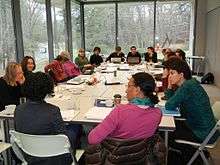Duke Islamic Studies Center
The Duke Islamic Studies Center, also known as DISC, is an inter-departmental, cross-cultural center at Duke University dedicated to the study of Islam and Muslims. DISC is one of the leading institutions in North America for Islamic studies, approaching Islam as a global religion with many distinctive historical and cultural expressions. Duke's tradition of strong humanistic approaches to the study of Islam and Muslims scholarship is complemented by emerging strength in social science approaches to Islamic Studies.
Established in 2006 as a sequel to the Center for the Study of Muslim Networks, the Duke Islamic Studies Center (DISC) continues to foreground Muslim networks, especially educational networks, as essential instruments for advancing cross-cultural understanding.
Faculty Leadership
Duke Islamic Studies Center is led by Professor Omid Safi, a prominent Islamic studies professor who received his bachelor of arts, master's and doctorate degrees from Duke. Prior to accepting this position, he was a professor of Islamic studies at the University of North Carolina at Chapel Hill. Safi has also been a frequent speaker on Islam in popular media, including in The New York Times, Al Jazeera, The Washington Post, BBC, NPR, NBC and international media. He also is active on social media and as a blogger, is a lead Islam writer for the Huffington Post, and his column “What Would Muhammad Do?” (https://web.archive.org/web/20130424081217/http://omidsafi.religionnews.com/) has been a regular Religion News Service feature.
Other prominent faculty leadership include Abdullah Antepli (Chief Representative for Muslim Affairs), and Jen'nan Read (Assistant Director of Special Initiatives).
Other core faculty include:
- Abdul Sattar J Al Mamouri
- Azeddine Chergui
- miriam cooke
- Christof Galli
- Benjamin Gatling
- Shalom Goldman
- Erdağ Göknar
- Bruce Hall
- Mona Hassan
- Frances Hasso
- Engseng Ho
- Maha Houssami
- Mary Hovespian
- Mohsen Kadivar
- Alex Kirshner
- Claudia Koonz
- Timur Kuran
- Bruce Lawrence
- Mbaye Lo
- Abdeslam Maghraoui
- David Marshall
- Ellen McLarney
- Negar Mottahedeh
- Fattaneh V Naeymi-Rad
- David Schanzer
- Rebecca Stein
- Mustafa Tuna

Projects and Initiatives
In addition to putting on a full slate of programs and events each semester, the Duke Islamic Studies Center sponsors special initiatives that reflect emerging leadership priorities and faculty interests.
Our most recent and most ambitious initiative is the Transcultural Islam Project. This multi-year project was launched in July 2011 with funding support from the Carnegie Corporation. This initiative has two overarching goals: 1) to inform public discourse and policy by publicizing and promoting scholarly and research-based information about Islam and Muslims; 2) to support scholarship and scholarly collaborations to advance research about Islam and Muslims across the globe.
Both of these initiatives were funded by the Social Science Research Council.
- ISLAMiCommentary
- TIRNScholars: Transcultural Islam Research Network
- Duke-RTI Professors & Practitioners Series
- British Council Our Shared Future
- Durham Library- Muslim Bookshelves
- DISC-Oxford Centre for Islamic Studies (OCIS) Partnership
- DISC Media Fellows
DISC Advisory Board
- D. Randall Benn
- Ken Close
- Eugene V. Fife
- Seham Al Foraih
- James P. Gorter
- Nauman Khan
- Bruce B. Lawrence
- Bettye Musham
- Charles Ogburn, Co-chair
- Kimberly Reed
- Hooman Sabeti-Rahmati, Co-chair
- Ayşe Soysal
- Marzuki Usman
- Dato Wan Ariff Wan Hamzah
- Hasnain Zaidi
